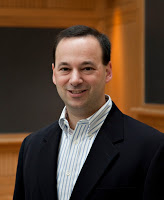- Public Policy
- Leadership
- Funding
- News & Events
- About the Center
Back to Top Nav
Back to Top Nav
Back to Top Nav
Back to Top Nav
It is fashionable these days to highlight the weaknesses of our method of selecting the next president. There certainly are plenty of gripes we could make, and I have made some before in this space. The campaign is too long. The primary schedule favors some states over others. The media coverage highlights trivial issues and ignores others that are more substantive. And don’t get me started on “super delegates” and other aspects of party politics. But, as we head into the final months before the election, why not for a change consider how well the process seems to have worked? We could begin by recognizing how unusual this campaign was destined to be. This year’s contest was a wide-open race from the beginning. It has been many decades since we have entered an election season in which neither party had an incumbent president or vice president seeking the nomination. It has made for an interesting 18 months, particularly from our vantage point on a campus in the first-in-the-nation primary state.
On the Republican side, the long primary season gave a leg up to those who engaged in good old-fashioned campaigning. Arkansas governor Mike Huckabee and Texas congressman Ron Paul, both relative unknowns, made a big impact early on, with the former winning the Iowa caucuses and the latter creating a buzz in fund-raising and debate circles. Both visited campus and engaged directly with Dartmouth students. By contrast, some better known candidates, such as former Massachusetts governor Mitt Romney and former New York City mayor Rudy Giuliani, were scarce around Hanover. Despite their experience campaigning for top executive-branch positions, it was easy to see—because we hardly saw them—that they were going nowhere. Meanwhile, the long primary season allowed Arizona senator John McCain to bring his campaign back from disarray last fall and lock up the nomination in the spring.
On the Democratic side, the nomination contest has been the most fascinating in the nearly 30 years that I have been following politics. The biggest surprise is that it took almost the entire primary season for a nominee to be chosen (and I’m taking a bit of a risk writing this before the convention in Denver). The campaign crossed racial, gender, and class lines in ways not seen recently. The voters ultimately favored candidates who had less experience in elected office but better rhetoric, fund-raising, and credibility in making an appeal for change. We at Dartmouth were proud to play a role by hosting a debate last fall and candidate visits leading up to the New Hampshire primary in January. For me personally, Illinois senator Barack Obama’s speech to more than 5,000 members of the community in the Rockefeller Center courtyard on Memorial Day 2007 was an event I won’t soon forget.
The challenge facing the primary system this year was to make sure a vigorous contest could be held to select the two final nominees from a very crowded initial field. While the process still has flaws, it did succeed in engaging students and other potential first-time voters. It also yielded a fine result: two candidates who represent their parties’ main principles but are positioned close enough to the political center to have considerable crossover appeal. It should make for a very interesting general election campaign.
 Andrew A. Samwick is the Director of the Nelson A. Rockefeller Center for Public Policy and the Social Sciences, the Sandra L. and Arthur L. Irving '72a, P'10 Professor of Economics at Dartmouth College, and a research associate of the National Bureau of Economic Research. In 2003 and 2004, he served as chief economist on the staff of the President’s Council of Economic Advisers.
Andrew A. Samwick is the Director of the Nelson A. Rockefeller Center for Public Policy and the Social Sciences, the Sandra L. and Arthur L. Irving '72a, P'10 Professor of Economics at Dartmouth College, and a research associate of the National Bureau of Economic Research. In 2003 and 2004, he served as chief economist on the staff of the President’s Council of Economic Advisers.